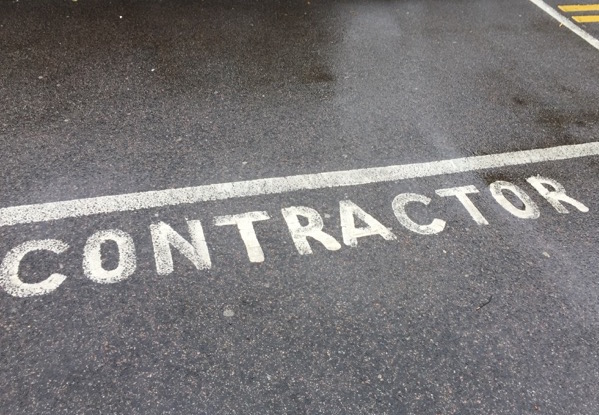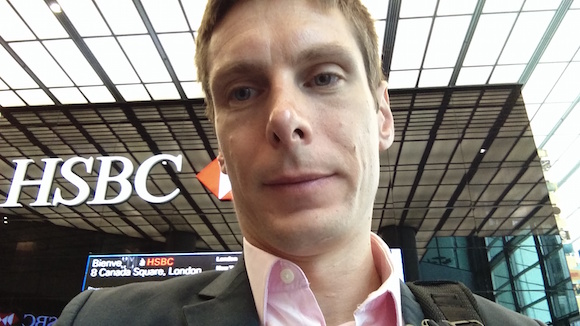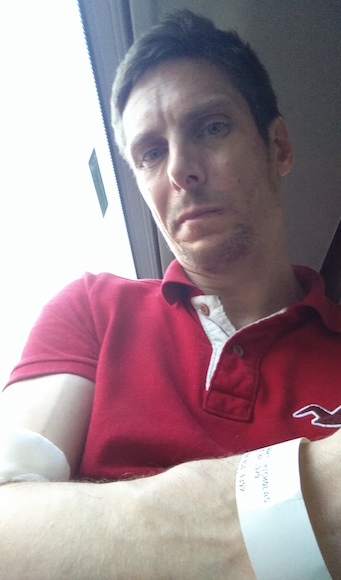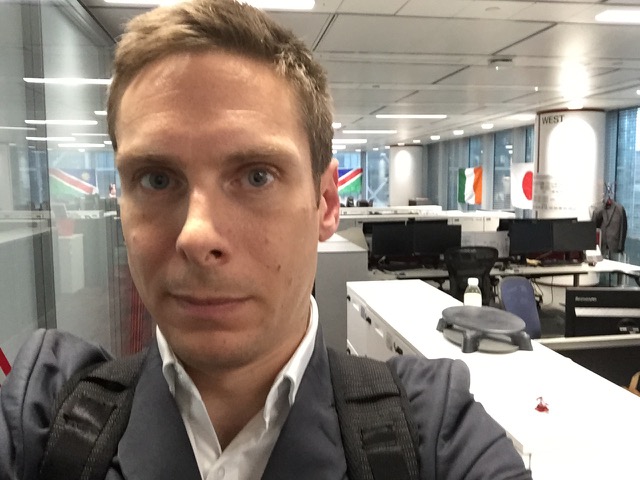This is a story about body shopping...

What's the difference between a temp, a freelancer, a self-employed person, a contractor and a consultant? What's the difference between an employee and an entrepreneur?
Last year I was working for HSBC, along with a bunch of nice folks from several different consultancies, plus a handful of permanent members of staff. The teamwork was brilliant, but the surprising thing was that we all had different agendas.
Given that I had gone back to HSBC as a contractor, having been a permanent member of staff there for over 4 years, it was somewhat of a mindset change. I was also homeless and still very much in the vice-like grip of drug addiction, which wasn't a good start.
I was exhausted, and I had somewhat induced within myself, some fairly major symptoms of mental illness, which caused me to make some rather outlandish interpretations of the reality I experienced.
Imagine being plucked from the park, where you are living and contemplating bankruptcy and the coffin nail that will drive into your career, your business. Imagine facing up to the reality that everything you're qualified and experienced to do, since you started IT contracting at age 20, is now going to go down the shitter, and you're homeless, abandoned by the state - the council have sent you a one-line email saying that you're not even worth a hostel bed to them.
Then, imagine that almost overnight, you're working on the number one project for the biggest bank in Europe. You're so exhausted that you are sleeping in the toilet. Everything seems surreal, from the moment you put on your suit in the morning in a hostel dormitory paid for with a credit card you can't afford to pay off, to the moment you turn up in the headquarters of a prestigious Tier 1 bank that you used to work for, when you were clean, sober, young, happy, ambitious, energetic, enthusiastic and respected.
The challenge was to get through 60 days of working, without running out of credit completely. I had to get to work every day and pay for my hostel bed, for a whole month before I could submit my first invoice, which would be paid 30 days later. Obviously, it also looks rather unusual to your colleagues if you can't afford to eat lunch or socialise. The pressure was immense.
What does a poker player do, if they have a weak hand? They bluff, obviously.
To compensate for my fear, and the odds that were stacked against me, I turned the dial up to 11. I tried hard. Far, far too hard. I told the team that I'd take responsibility for a critical piece of work, and deliver it in a short space of time, along with an extremely capable colleague, who actually knew that it was a monster piece of work.
I should have been laughed out of the door. I can't believe that nobody particularly picked up on the fact that I was shooting from the hip, out of a combination of fear, exhaustion, drug withdrawal, mental illness and a touch of arrogance.
How on earth was my ego not going to be stoked? I had just cheated death, bankruptcy, destitution, and now I had the CIO of the number one project in the biggest bank in Europe surprising me, by naming me in person, as the team member responsible for one of the pivotal pieces of the program, in front of the entire town hall. I looked around - "is he talking about me?" - yes, it appeared he was. How surreal.

As a drug addicted homeless person, you're kind of invisible. People would like it if you just crawled into some dark hole and died, quietly. You're nobody's problem but your own, and everybody pretends not to notice you, as you drag your bags through the street, swatting at invisible flies and talking to yourself incomprehensibly.
Suddenly, people not only seem to value you, listen to you, but also look to you for some kind of professional guidance, leadership. Is this the state that important IT projects have reached, where the hobo junkie is the one calling the shots? I realise that I wasn't actually calling the shots, but that's what it feels like when you've been scraped up from the pavement, stuffed into a suit and now you're working in a fancy office full of glass, steel and granite.
It embarrasses me, but also pleases me that I'm still on good terms with a few respected colleagues, and they can tease me about "the time when you said you were going to deliver X by Y". However, not everything I said was worthless tosh.
This is where the difference in mindsets comes in.
As a permanent member of staff, your best shot of getting pay rises and promotions is to raise your profile. Given an hour to do some work, you might as well spend 50 minutes writing an email about what a brilliant person you are and how clever you are, and 10 minutes actually doing some work, rather than the other way around. People who just knuckle down and get on with the work they're supposed to be doing, tend to be overlooked when it comes to the end of year review.
As a contractor, you're all about contract renewals. When your contract is coming up towards its end, you're on best behaviour. You try to shine and make yourself a key-man dependency, so that you can demand a big rate increase, because you're indispensable. Personally though, I hate making myself a key-man dependency. It's unprofessional, however you are economically incentivised to do it, so many contractors dig themselves into little fiefdoms.
As a consultant however, you have the worst of both worlds. You have to kiss the arse of both the client and your consultancy. There's a huge conflict of interests. The consultancy want you to stay on your placement, and for as many headcount as possible to be working with you on the client project, if you're working time & materials. What exactly is consulting about being a disguised employee? Where is the value-add from the consultancy, when the client wants you to be embedded in their organisation, like a permanent member of staff?

The reasons for using consultancy staff, contractors, temps, freelancers, is that you can get rid of them when the project is done. However, the other reason is that you don't have all the headache of having to performance manage underperforming and difficult staff members out of your organisation. In theory, it's a lot easier to hire & fire... with the firing being the desirable bit.
It used to be the case that you could get a job as an IT contractor with just a 20 minute phone interview and start the next day. If you were shit, you'd just be terminated on the spot. Never happened to me, but that was the deal you struck... you'd be on immediate notice for the first week. Then you'd be on a week's notice. Then you'd be on 4 weeks notice, just like a permie. However, I always used to get my contract renewed, because I know how to play the game, kiss ass and keep my lip buttoned at the right time.
So, what happened? Well, stress, money, recovery from addiction, relapse, housing stresses and everything in-between conspired in my private life to mean that I was living life by the seat of my pants. I was running for my life.
After only a week in the new job, I decided that it was an impossible mountain to climb, and that there was no way that I could live in a large hostel dormitory and work on a stressful project, plus get myself clean from drugs, plus dig myself out of near-certain bankruptcy. There were just too many problems to face, working full-time in a crisply laundered shirt and a nice suit, while hiding the crippling problems in my private life.
You can't just go to your boss and say "I'm sorry I didn't mention this before, but I'm a homeless recovering drug addict, who suffers mental health problems at times of extreme stress and exhaustion, and I'm practically bankrupt as well as barely able to keep myself clean, sane, out of hospital and off the streets". Contracting doesn't work like that. Your personal life is nobody's problem but your own... you've signed that deal with the devil. You get paid more, but you're also expected to not get sick and not bring your personal problems with you to the office.
I disappeared on my second week in the job, getting mixed up with the police, thrown out of the hostel where I was living, and ending up in hospital, as the pressure was simply too much to bear, I thought that my lifeline was pretty much spent. The odds of being able to get off the streets were too slim anyway. It couldn't be done. I gave up, and relapsed.
Do you think you can just pick up the phone and say "errr, yeah, I need two weeks off to sleep, an advance of several thousand pounds, and I'd like to come back to work part-time for a little while until I'm up to full strength, because I've been dragging bags all over London, living in parks and on heathland, in and out of hospitals, rehabs and crisis houses, addicted to some deadly shit and battling mental health problems. It seems silly that I didn't mention this at the interview, as I'm sure you would have been just fine with giving me an opportunity to get myself off the street and back into the land of the living"?

You know what though? I did get a second chance. There's no denying that certain allowances were made for me. A blind eye was turned to the fact that I was basically either shouting at people or nodding off in meetings for the first week. I went AWOL twice. Once for a whole week where I basically decided that everything was f**ked and there was no way I could ever make things work, and once for nearly a whole day, when I was swept up in the euphoria of working with nice people and got paralytically drunk with my colleagues and couldn't face telling my boss that I was sick again.
Through my divorce, I lost heaps of friends who were shared with me and the ex. I decided to move back to London, because I knew I could find lots of work. However most of my London friends had moved out of town, in order to start a family. Also, you don't make many friends when you're living in a park sniffing supercrack, and getting hospitalised for 14 weeks a year. I can tell you more about the private life of a friendly police officer that I know, than I can tell you about some other acquaintances from that turbulent period.
Anyway, I was desperately trying to cement things - get my own flat, get some money in the bank, get into a working pattern that was sustainable - but it was too much to ask. 'Friends' sensed that I was recovering, and decided to come asking for favours : lend me some money, let me live with you, give me a job etc. etc.
When you're desperately lonely, because you've split up with the two loves of your life - your wife, and supercrack - you're vulnerable to wanting to people-please. I risked my reputation, when I got a so-called friend an interview, because he pressured me. I overstretched myself, renting a flat that swallowed up all my money, which was my safety net. I didn't even pick my flat... my friend did, and he thought he was going to get to live there rent free. I put up with a lot of shit, because I was desperate for friends, for acceptance, to be liked.
If you think all this can be boiled down to a 'drug problem' you're wrong. In order for a person to feel whole, they need friends, they need a job, they need a place to live, they need to feel that they're living independently : paying the rent, earning their money, able to pay for the essentials of life, and not always just hustling, on the run.
There are quite a lot of pieces to the puzzle that is a complete life that's worth living. Do you really think I just want to be kept alive, in a straightjacket in a padded cell. Is it unreasonable to want to work, to want to feel like I'm making a contribution, to want to feel like I'm liked, loved, to want to feel like I exist, and that I'm valued somewhere, by somebody?
I loved the instant social connection I had with the "winners" who were a group of fellow consultants at HSBC. There was good camaraderie, and they were young and enthusiastic, not bitter and jaded like me. Their enthusiasm for their job and inclusive social circle was exactly what I needed, along with cold, hard cash, and a place to go every day that wasn't a bush in a park, with a wrap of supercrack.

Somewhat unwittingly - although I don't know how much people were able to guess or find out behind my back - the Winners bootstrapped my life. Even though there were the usual commercial rules of the game, about being a disposable contractor who's supposed to keep their mouth shut and not rock the boat, there was still bucketloads of humanity there. People were kind to me. They invited me into their lives, and in doing so, they saved mine.
When a colleague texted me while I was in California, to say that we had to go back to work doing the shittiest possible work for a scrum manager we didn't have a whole heap of respect for, it was pretty clear that it wasn't sustainable. I busted my balls to get cleaned up, off the streets, into a flat of my own and to restabilise my finances. However, I've never been the best at buttoning my lip and allowing myself to be 'managed' by somebody I have barely concealed contempt for.
I knew that all I had to do to get my contract terminated was to send one or two fairly outspoken emails to the project's management team who were insecure and relatively incompetent. They'd actually started to listen and change things though, so there was no purpose to the emails I sent, other than to try and elicit an email saying "don't bother coming back to work" so that I could spend some more time with my friends in San Francisco.
The pressure of having to try and cement the gains that I had made, while still carrying some of the burdens that had been accumulated, was too much. I was in no position to be the responsible guy, picking up the phone every time things went wrong and having to mop up messes. I was in no position to be paying 100% of my rent, with a lazy flatmate who shared none of the risk and none of the financial burden or responsibility for making sure the bills got paid and the household ran smoothly. I was in no position to face months and months more, working at the kind of breakneck pace that was inevitable on a project that I had been forced to take out of desperation.
I had done far too many 12 or 14 hour days. I was on email around the clock. I never switched off. I had driven myself insane, pressurising myself to fix all the broken things in my life, and shore up the gains that I had made. Insecurity and fear had given way to delusions of grandeur. I wanted to do everything, for everybody, immediately. I was very, very sick, because of the enormity of the task of not only the project, but the problems I was overcoming in my personal life. A breakdown was inevitable.
Managing things elegantly was unlikely to happen. I dropped hints about needing a holiday, but I needed to be firm, to assert myself. People expected me to manage my own personal needs, but what they didn't realise was that my needs were conflicted: I needed a financial safety cushion just as much as I needed some time off. When the offer of overtime was wafted under my nose, and the management team wouldn't stop phoning me up at weekends, they didn't have to twist my arm very hard to get me to work Saturdays, Sundays, nights. I needed the money, and I needed to feel like I was important and valued again, having only just escaped being an invisible homeless bum, tossed out of civilised society, never to return.
My experience as an IT contractor, my seniority as somebody who's run large teams, as a Development Manager, an IT Director, a CEO... I'm no fool. I knew that I was working at an unsustainable pace, making myself sick, but what choice did I have? I had so much to fix, and money and hard work can fix most problems. I knew that I needed a holiday, but I was vulnerable to being pressured into doing things that I would never do, under normal circumstances, due to the fragility of my situation.
My colleagues were kind enough to drop hints, and to tell me the tricks that they were employing to avoid management pressures and the general panic that was endemic on the project. They could see I was tired, and going slightly mad. They were worried, and it was kind of them to think of me, on a personal level. However, they didn't really know just how bad things were in my private life. They didn't know just what a journey I had been on. They didn't know what I was running away from.
When I snapped, I didn't know where to run for safety. I thought the safest place would be hospital. I was desperate. I could easily have run for drugged-up oblivion again, even though I was 5 months clean at that point, and one month sober. I could easily have run for the kitchen knife, and slit my wrists in the bath. I was desperate. So close to recovery, and yet so far.
I needed to chuck my freeloader flatmate out of my apartment. I needed to quit my contract and get something easier. I needed to not have the expectation, the weight of responsibility I had unnecessarily brought upon myself, in my desperate insecurity and desire to feel wanted, needed, useful, important, after my entire sense of self had been smashed to a pulp by the dehumanising experience of destitution.
Hospital was a safe place to do it.
Then, unable to grasp the nettle of what needed to be done, which could have been as simple as saying "I need another two weeks off work, to go on holiday, because I'm fucked", I decided to just run away. I booked a flight to San Francisco, leaving myself just a few hours to pack my bags and get to the airport. What was my plan? I had no idea. Even suicide seemed preferable to continuing to live with such crushing pressure, fear and hopeless odds stacked against me.
After a few days amongst friends, I decided that I wanted my contract terminated, immediately. I fired off a provocative email to the CIO. Jackpot! The guy who was responsible for us consultants emails me to say that he wants to see me... in Wimbledon, miles away from HSBC headquarters. I mail back to ask why, but he deftly avoids telling me my contract is terminated via email, despite me pressing him on the matter. Does nobody get the hint?

I come back to London, pissed off that nobody has had the guts to actually call me out to my face, or even by email, and that I've not been able to extend my stay in California. Out of spite, I decide to embarrass the consultancy and the management team, by going into HSBC HQ, blagging my way in even though my security pass has already been deactivated. I march up to the program director and ask him if he's happy with my work, is there a problem? In front of the whole team, he says he's happy with my work and there's no problem, he's pleased to have me back at work.
I milk a few hello-goodbyes with colleagues who I like and respect, while watching the people who want me gone squirm with discomfort. I'm loving every second of watching who's got integrity, humanity, and who's decided that I'm no longer flavour of the month. It's a masterclass in office politics, even though we're all contractors, all consultants. I'm committing every exquisite detail of my final minutes in the office to memory, as I deliberately waste time having my breakfast, before making my way to Wimbledon to wind up the poor messenger whose job it is to try and help the consultancy and the management team save face, by terminating my contract.
By this time, my access to email has been revoked, even though a colleague who accompanies me out of the building, pretends like everything is normal and like we're just having a friendly chat - as opposed to being escorted off the premises by a security guard. I know. Do they know I know? Surely they must.
Unable to send a goodbye email, I ask a colleague who is also called Nick Grant, but who works in Leeds, to send an email on my behalf to a mailing group that contains everybody on the project. It's naughty as hell, but I'm enjoying twisting the knife. What is it that I've really done wrong, other than getting sick and having to go to hospital? What is it that I said, other than what needed to be said, the truth? But I know the game. I know that nobody wants a loose cannon. Nobody wants anybody rocking the boat. I didn't play by the rules. Does anybody realise that this is my way of quitting with immediate effect, and without having to work my notice period?
It might seem like sour grapes. I needed that job. I liked my colleagues. I loved that social scene. That contract saved my life.
However, how do you reconcile your social life, your personal difficulties, your needs, with the role you've been forced into?
What's the difference between a contractor and a consultant? A contractor knows they're a mercenary. They're there to earn as much cash as quickly as they possibly can, and they accept that they can be terminated at the drop of a hat. A consultant just doesn't realise they're getting a bum deal. There's no such thing as an IT consultant. It's just a made-up thing now that software houses and long-term IT contractors have fallen out of favour, with the dreadful rise and rise of outsourcing and this stupid idea that software is ever going to be cheap and easy.
So, to the Winners. Thank you for saving my life. Thank you for putting up with my rocky start, my dreadful ego, my shouting. Thank you for putting up with my arrogance, and for laughing at my over-ambitious ideas. Thank you for trying to keep me humble, and remind me of the rules of the game. Thank you for taking me into your lovely social world. Thank you for the emotional support. Thank you for treating me like a human being, not a software robot. Thank you for dealing with the fallout that I inevitably caused, when implosion happened. Thank you for not hating me, as I wandered into the territory of delusions of grandeur and heroics, and self-important jumped-up craziness.
You might not realise this, but you saw a rather twisted, weird, screwed up version of me, as I clawed my way up a cliff face of recovery, from the bankrupt, homeless, junkie, friendless, single, lonely, unhappy, insane husk of a man that I was, in mid-June last year.
It's been quite a year. God knows what happened with the Customer Due Diligence project, but I'm glad the due diligence on me didn't work, because the Winners and HSBC ended up unwittingly saving my life and getting me back on my feet. I don't think I would have ever had that opportunity if my dark private life was known in advance.
I'm sorry if it feels like I used you. Hopefully, it feels like a good thing happened. Hopefully you feel happy to have played a role in bringing a person back from the brink, even if I was a sneaky bastard, and somewhat underhand about the whole thing, as well as going a bit bonkers at times.
Silver linings, eh?

The photos I've put up include some rather unflattering images of a rather battered and bruised body, that just about hung together with sticky tape to somehow carry me through some brutal times. My private life wasn't exactly 'healthy' leading up to last June.
Tags: #career #banking #hsbc #computing #london #suicide #addiction #homeless


